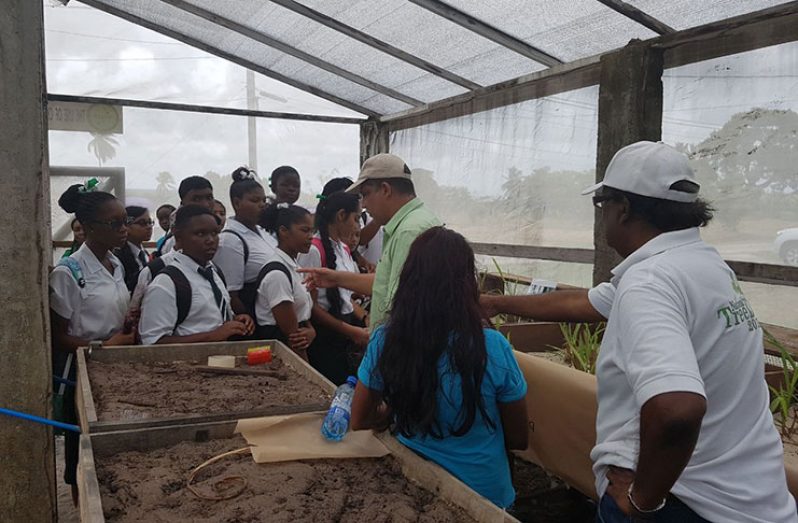–as ICCA, NAREI encourage enriching soil with charcoal
THE National Agricultural Research and Extension Institute (NAREI) held its Open Day recently at Mon Repos, East Coast Demerara and one of the highlights was ‘The use of charcoal as a soil amendment on degraded soils in Guyana’.
The project is being done in collaboration with the Inter-American Institute for Cooperation on Agriculture (IICA).
A number of primary, secondary and university students, along with crop and livestock farmers and stakeholders within the bioenergy fraternity were invited to witness the demonstration of Giant King Grass plants grown in charcoal-amended soil under shade house conditions in NAREI’s compound.
When this project is completed by March 2018, farmers on marginal and degraded soils will be trained to improve their soil quality, using ground charcoal as a good agricultural practice.
Spearheading the project are NAREI’s Research Scientists, Mr. David Fredericks and Ms. Tracy Persaud, with the help of Research Assistants, Denisia Whyte and Jadason Bess.
The team chose the Giant King Grass as a test crop to explore its potential as a feed for livestock, a biomass source for bio-energy and bio-char for the rehabilitation of marginal or degraded soil.
The soil material used was sourced from the Kara Kara mining site in Linden. The first harvest was completed earlier this month, and the rationed regrowth for the second harvest is in progress.
The project was introduced to Guyana last year, after IICA sponsored a training session on the ‘Management of Degraded Soils using Organic Matter in the Caribbean’, which was held in Jamaica. Persaud attended this training in which participants were expected to implement rehabilitation projects for degraded soils.
NAREI’s Chief Executive Officer, Dr. Oudho Homenauth told his guests that since the Institute is promoting a ‘green’ economy, soils are very important to doing it successfully. “We are looking at hinterland areas, and Linden as well where there are marginal soils that are poor for agricultural production,” Dr Homenauth said.
Dr. Homenauth explained that with the necessary amendments, the soils could improve its quality. He said that ICCA has provided both financial and technical support for the project, which is currently in its trial stage.
IICA Country Representative, Mr. Wilmot Garnett, advised the students that they, too, could try soil amendments in their kitchen gardens and grow healthy food.
Soil degradation is a phenomenon that reduces the soil’s capability to provide sustainable environmental services. Currently in many Caribbean countries, the use of unsustainable agricultural practices are causing soil erosion, sedimentation in rivers, exhaustion and degradation of water sources, and loss of native vegetative cover and biodiversity, all of which represent higher vulnerability to climate change and a reduced capacity to produce agricultural commodities and services.
These impacts can be lessened with the use of sustainable land management approaches. The soil amendment strategy aims at improving quality of soil and its resilience to climate change.



.jpg)








